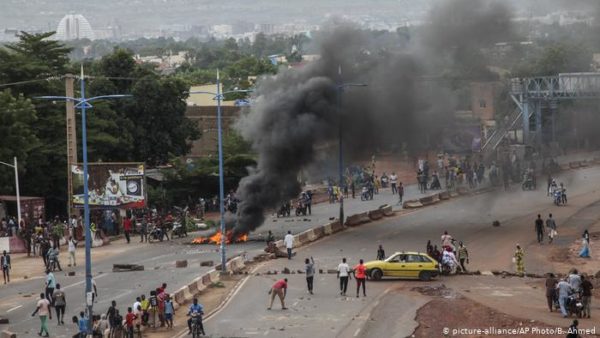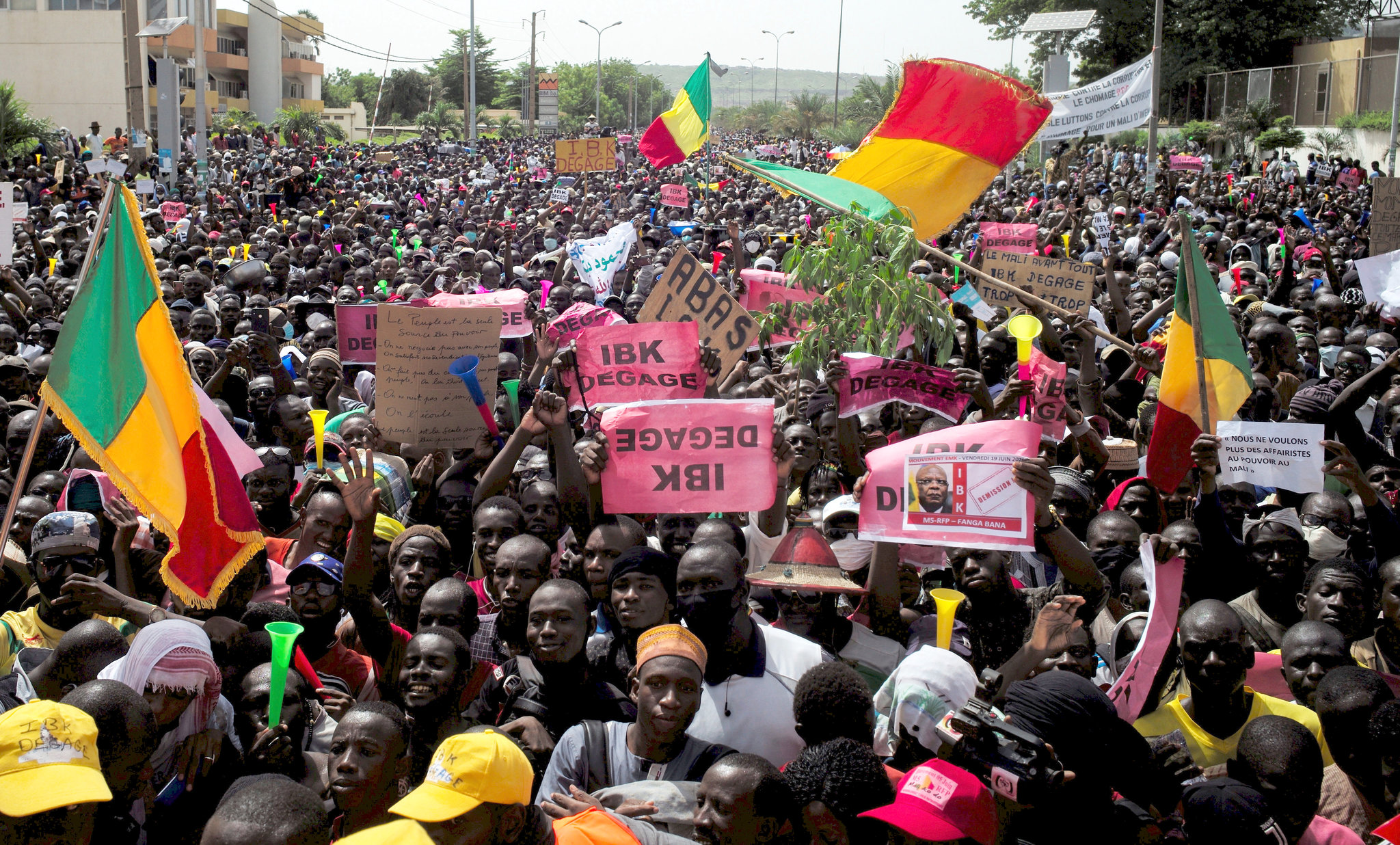A number of protesters have been killed, the internet disrupted and the state broadcaster attacked as a mammoth anti-government demonstration in Mali turned violent, with many press freedom violations.
Bamako was paralyzed by scenes of looting and violence on July 10, 2020 as thousands of Malians massed up at Independence Square in Bamako in response to a call to civil disobedience made by the M5-RFP (a coalition of the opposition political parties, civil society and religious organisations).
The National Assembly was vandalized. Several government buildings were occupied and three principal bridges in the capital were blocked. Thick smoke overshadowed the morning sunlight as the youth burnt car tyres on several principal roads in a fit of rage.
The security forces responded with brutal force to acts of violence and vandalism by protesters by firing warning shots, attacking with truncheons and tear gas, with official sources confirming one dead.
A hospital source however told the MFWA’s correspondent that the demonstrations left 3 dead, with the Centre Hospitalier Universiataire Gabriel Touré (CHU GT) and the Bamako reference health center receiving a total of 74 injured protesters between them. The organisers of the protest say about eight people were killed over two days. Shooting of tear gas by the police continued all Friday evening to disperse the protesters.
The protests continued on July 11, in several major arteries in the Malian capital. In districts like Magmanbougou, Niamakoro, Baco Djikoroni and Faladie, protesters burned tires and placed giant barricades on the tracks.

In line with the recent problematic trend during anti-government demonstrations in Africa, the internet was disrupted.
Netblocks, an organisation that monitors internet shutdowns, announced on June 10, that early reports indicate that the internet and social media had been censored.
Press Freedom Violation
The State broadcaster, Office de Radio-Television du Mali (ORTM), was hard-hit by the violence. Several of its offices in Bozola (the ORTM headquarters) were ransacked and equipment belonging to the broadcaster were looted.
ORTM was invaded and chaotically occupied and vandalized, with the resulting losses running several hundreds of millions of CFA francs. Two vehicles belonging to journalists were also set on fire.
The state broadcaster stopped broadcasting the evening of July 10 after the invasion of its premises over several hours. This chaotic situation continued until midday on July 11.
The ORTM offices and its journalists were not the only victims of the protesters’ violence. A number of journalists had a bitter taste of the protesters’ violence, while the security forces’ robust response also led to several press freedom violations. Mamadou Cissé, journalist with the Horon Group, told the MFWA correspondent: “I was arrested by the police while I was reporting and then released later”.
Journalist Hawa Kamissoko of the Liberté TV Group was arrested in the middle of her coverage by police officers who shoved her into a pick-up. Her close associates reported her release at 6 pm the following day (July 11).
The media organisation Groupe Ernergie in a press release also reported attacks on its reporters on July 10. According to the Group, journalists Harouna Keïta, and Fanta Cisse were robbed of their phones, camera and wallets.
“We condemn with last energy this barbaric and despicable act while reassuring that legal proceedings will be initiated for the purpose of finding the perpetrators,” concluded the release signed by the Editor-in Chief, Moussa Salif Diarra.
Moussa Koné, a correspondent of international media, testified: “I was beaten with batons and my corrective lens crashed to the ground. It’s the same contingent that killed the boy in Badalabougou.”
Arrests of Protest Leaders
Several leading figures behind the demonstrations were arrested immediately after the demonstration on July 10. They include the General Coordinator of the Coordination des Mouvements, Associations et Sympathisants (CMAS), Issa Kaou N’djim, who was arrested at his home. Others were Nouhoum Sarr of the FAD party, Adama Ben Diarra and Clément Dembele.
Another wave of arrests was carried out the following day. Former Ministers Mountaga Tall and Choguel Kokalla Maîga were arrested during a meeting at the office of the main opposition leader.
Imam Mahmoud Dicko, a powerful religious leader who played a crucial role in mobilising the masses, reported himself to the police to be detained in solidarity with the arrested protest leaders.
Indignation and Appeal for Dialogue from Prime Minister
Prime Minister Boubou Cisse, on a visit to the CHU GT (the University hospital) on July 11, expressed his anger and indignation.
“I came to visit the wounded from yesterday’s events. I came to tell them that the Head of State is a man of peace and dialogue. He will never stop urging us to dialogue so that we find the solution to our problems by listening rather than the confrontation. “
Prime Minister Cisse has appealed to the leaders of the M5 movement to “frame demonstrations in the spirit of the constitution as well as laws and texts relating to the exercise of freedoms.”
Protesters’ Demands
One of the demands of the protesters is to see President Ibrahim Boubakar Keita resign for perceived failure to tackle insecurity, corruption, mass unemployment and Mali’s worsening economic situation.
Since 2012, Mali has been experiencing a multifaceted, security, political and economic crisis. S Neighboring countries including Niger and Burkina Faso are also paying a heavy price.
Elected in 2013 at the end of the long process of transition from the crisis arising out of the military coup of March 22, 2012, President Keita started of his tenure on the crest of wave of popular support. Now he appears weakened by the upheavals of governance and public life and his ratings have plummeted in recent years. It should be remembered that since coming to power in 2013, he has been the subject of several medical evacuations abroad.
International Community Reaction
The international community has reacted by condemning the violence exhibited by both sides and urged the government to release the arrested leaders to facilitate dialogue.
A statement issued by representatives of the ECOWAS, the African Union, the European Union and the United Nations on July 12 condemned “the use of lethal force in the maintenance of order and invite all stakeholders to exercise restraint and to always prioritise dialogue, concertation and peaceful means of crisis resolution.
The Media Foundation for West Africa also condemns in the strongest terms, the excesses on both sides. We find it unfortunate that both sides attacked journalists and destroyed the equipment of media professionals who were only performing their legitimate duties. While condemning the killing of demonstrators, we demand thorough investigations into all the acts of lawlessness for appropriate sanctions to be applied against the perpetrators.
